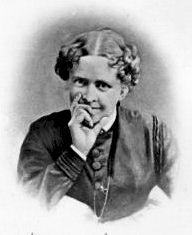|
 |

Part of the American
History & Genealogy Project |
Helen Hunt Jackson 1831 ~ 1885


Helen Hunt Jackson
She was born in Amherst, Massachusetts,
October 18, 1831. Her father, Nathan W. Fiske, was a professor
of languages and philosophy in the college of that town. When
twelve years of age both her father and mother died, leaving her
to the care of her grandfather. She entered the school of Rev.
J. S. C. Abbott of New York.
At twenty-one she married a young army officer. Captain,
afterward Major, Edward B. Hunt. They lived much of their time
at West Point and Newport. Major Hunt was killed in Brooklyn,
October 2, 1863, while experimenting with a submarine gun of his
own invention. After a year abroad and a long illness in Rome,
she returned to this country in 187.
In her first small book of verses she was obliged to pay for the
plates when they appeared, and it was only after years of hard
work that she succeeded in her literary career. Her health
becoming somewhat impaired, she moved to Colorado, and here in
1876 she married Mr. William Sharpless Jackson, a banker and
cultured gentleman. They made their home at Colorado Springs,
and it became one of the attractions of the place, her great
love for flowers beautifying her surroundings.
Here she wrote her first novels, "Mercy
Philbrick's Choice" and "Hetty's Strange History,"
also, later "Ramona," but her strongest work was
brought about through her intense interest and indignation over
the wrongs of the Indians inflicted upon them by the white race.
She advocated education and Christianization of the race rather
than their extermination. Leaving home, she spent three months
in New York in the Astor Library gathering facts and material
for her "Century
of Dishonor." When published she sent a copy
to each member of Congress at her own expense to awaken interest
in her favorite theme, and this resulted in her being appointed
special commissioner with Abbott Kinney, her friend, to examine
and report on the condition of the Indians in California. She
went into the work with enthusiasm and energy and the report was
most exhaustive and convincing.
In the winter of 1883, she began to write her famous novel,
"Ramona," and we quote her own language when she says of it "I
put my heart and soul into it." The book enjoyed wonderful
popularity not only in this country but in England. In June,
1884, a fall caused a long severe and painful illness. She was
taken to Los Angeles, for the winter, but a slow malarial fever
followed and she was removed to San Francisco and on the evening
of August 12, 1885, she died.
Her two works "Ramona,"
and "Century
of Dishonor" will ever preserve her name among
the famous literary women of America. "The Century of Dishonor,"
has placed her name among the up-builders of our nation. She was
buried near the summit of Cheyenne Mountain, four miles from
Colorado Springs, a spot of her own choosing and which is today
one of the shrines of America.
Women of
America

Source: The Part Taken by Women in
American History, By Mrs. John A. Logan, Published by The Perry-Nalle
Publishing Company, Wilmington, Delaware, 1912.
|